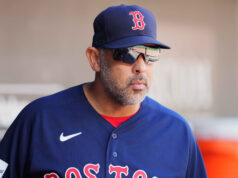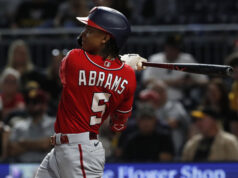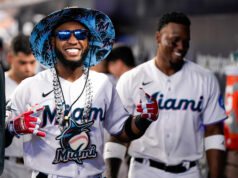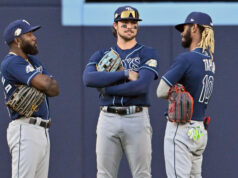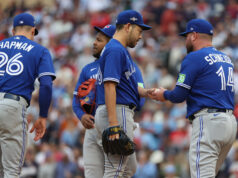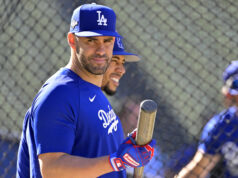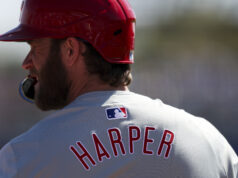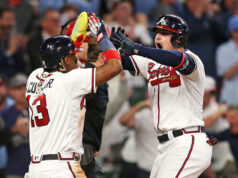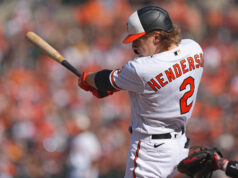Tanking in the NBA, NFL, MLB, or NHL might mean access to top draft picks, but top draft picks don’t always correlate with success.
By William Chase
 The Houston Astros were one of the worst teams (176-310) between 2012 and 2014 in Major League Baseball just a few seasons ago.
The Houston Astros were one of the worst teams (176-310) between 2012 and 2014 in Major League Baseball just a few seasons ago.
It was pretty much summed up by Chicago Cubs’ President Theo Epstein and Co. what it was going to be like on the North Side for a few years as the rebuild went under construction; the Cubs overhauled their entire operation and rebuilt the farm system for the potential of long-term, sustained success.
The Tampa Bay Devil Rays? Just an awful team for years. Last place after last place, the first round draft picks piled up.
These teams are good now.
The Devil Rays dropped the Devil and immediately turned in a worst-to-first campaign—it was more than just a name change, but the franchise’s upswing happened immediately there after the name change—and they went to the World Series in 2008. They’ve been a legitimate contender since, even with a limited payroll and high turnover of players on the field.
The Houston Astros and Chicago Cubs nearly pulled off the same feat in 2015. The Cubs won 97 games; the ‘Stros won 86, just narrowly losing out on the division title en route to winning the Wild Card, and advancing to the Best of Five against the eventual World Series Champion Kansas City Royals.
The Royals are another team that is now very good.
Despite what some might say, it’s not that tanking works. It’s how you tank. Or more precisely, how bad teams turn their fortunes around, using the means within, and outside of the organization, to become like these aforementioned bad-turned-good franchises.
In the NHL and NBA there’s a lottery system. A perennial last place team could wind up never getting the first pick. Losing increases the odds, but it’s no sure thing. The No. 1 draft pick is no sure thing. In the NFL the Cleveland Browns have been awful for what seems like the entirety of their second Cleveland existence.
The NBA readjusted their playoff seeding in order to prevent tanking so teams can’t try to get out of unfavorable first-round match-ups.
The Edmonton Oilers have had the first pick in the draft four of the last six seasons. They’ve only finished outside of last place twice since 2010, and only as high as third in the strike-shortned 2012-13 season.
https://www.youtube.com/watch?v=Kb9_zn3G-sk
It’s simple. A first round pick, an abundance of first round picks, do not simply mean automatic success. Would the Chicago Cubs have won 97 games with Rick Renteria as their manager in 2015? Probably not. Nothing against Renteria, but Joe Madden is a seasoned, veteran manager who has proven his ilk during the Rays days.
You need someone who can lead a young group, and who also knows how to keep the mood light when adversity strikes. That’s where someone like Maddon steps in.
First round draft picks have to fully develop and hit their potential. The Chicago Cubs and Houston Astros have hit the motherload, an abundance of prospects that came to the Major Leagues, flying out of the shoot.
Baseball is one sport that doesn’t feature a hard salary cap, the luxury tax notwithstanding.
The Columbus Blue Jackets might just be the chief disappointment in the NHL, a team rife with playoff aspirations coming into the season. Tanking might give them a better chance at Auston Matthews, but really all the losses would ensure is just more pingpong balls.
I’d rather see teams win as many games as possible than settle for a non-guaranteed shot at the first pick.
The one upside to the general Canadian stinkery in the NHL: Auston Matthews! https://t.co/sNoEVN3tag
— Scott Stinson (@scott_stinson) February 5, 2016
Last season, the Jackets’ 15-1-1 at the end of the season was enough to convince management that they were ready, and able, to compete. That winning stretch at the end was the fools gold that has the team where they are now. Will Austin Matthews be enough to turn them around for 2017?
Probably not.
At this point it certainly wouldn’t hurt for anyone to add him. Still, is tanking ever a worthwhile solution? What does it tell your fanbase; the illusion is to win in the longterm but that much is not guaranteed. Trying to sell tickets in the present is still at the forefront for any business.
I don’t believe teams really go out there intending to lose. But when the season is all but done, and your club is mathematically eliminated, or even technically still in the race but trailing the pack like Secretariet is leading the race, players may not go all out as much as they normally would.
It’s a defeating feeling.
The Cubs were bad before new management came in. The competent front office staff is in place now; the right manager is in place. Shrewd trades were made, the possible over-the-the-hump free agents were lured, and the kids who were promoted from the minor leagues excelled, in year one.
The plan is in place.
Every team would like to think they have a similar plan in place. However it’s less to do with just having the first pick in the draft, but surrounding the right pieces with the draft picks.
Fail for Manziel didn’t work out too well in Cleveland for the Browns. Even if Manziel didn’t have the off-the-field drama, there’s never really an idea as to how well someone will fulfill his own potential.
Ryan Leaf, Matt Bush and Sam Bowie anyone?
Check out Brad Pitt, er Billy Beane in Moneyball.
Talking to the character portraying Oakland Athletics scout Grady Fuson, Pitt, acting as A’s GM Billy Beane, says:
“You don’t have a crystal ball. You can’t look at a kid and predict his future any more than I can. I’ve sat at those tables and listened to you tell those parents “when I know, I know. And when it comes to your son. I know. And you don’t. You don’t.”
You just don’t.




